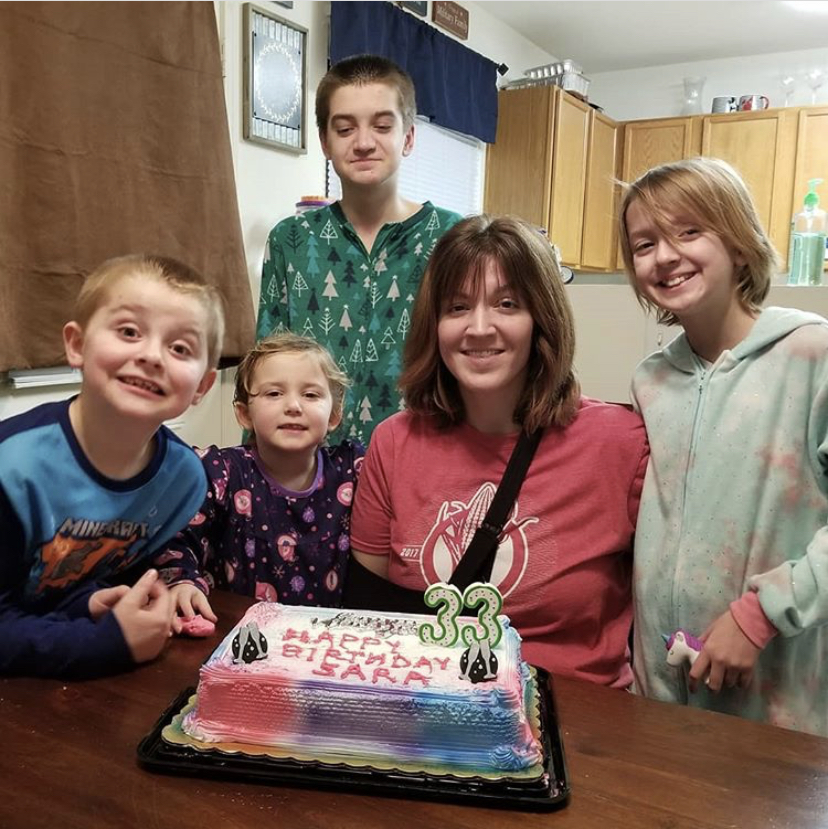
When Sara Rosemeyer looked at the pictures of her mangled van, she was in shock. “I am so grateful that we are all alive today,” she says. “It could have been a lot worse.”
Several months ago, Sara and three of her children were hit head on in her minivan by another driver. Sara was following her husband, Adam, and son, Liam, when a driver from the other direction blacked out and swerved head on toward her husband’s car. Adam managed to swerve and get out of the way. But there was not enough time for Sara to do the same. She remembers bracing herself for the collision and hearing her kids scream. Then there was another jolt and a loud clash of metal. Another car had hit them from behind.
Click here to learn more about what makes our Trauma Center the best place to be for life-threatening injuries.
Sara and her children were taken by ambulance to the Nebraska Medical Center Level 1 Trauma Center. When they arrived, the trauma team was waiting. Each was rapidly assessed and then taken to the CT or CAT scanner for imaging.
.jpg)
“Noah’s injuries, which included tears to the spleen, liver and kidneys, were potentially life-threatening, so he was immediately moved to the Pediatric Intensive Care Unit (PICU),” says Charity Evans, MD, the primary trauma surgeon on the scene. Once the others were stabilized, they were moved to the intensive care unit for continued observation.
Sara suffered a concussion, broken arms and broken hand. Layla, 10, had abdominal bruising, bruising to organs and a tear to the pancreas. The youngest, four-year-old Sadie, suffered a concussion and bruising and was able to go home with her dad later that day.
“We were all bruised from head to toe,” recalls Sara, who notes that they were all in seat belts. “It looked like someone had taken a bat to us.”
Thanks to the skill and expertise of the trauma team who are trained to treat both children and adults, Sara and her three children were all able to stay at Nebraska Medical Center.
“One of the many advantages of our trauma center is that we have the staff and resources to care for multiple patients at one time,” says Dr. Evans. “We are also trained and prepared to treat both children and adults so the family didn’t have to be sent to different hospitals. That’s very important for parents and children as it can help minimize some of the trauma and fear they are feeling when they can physically see each other or know that each is close by.”
“It was comforting being close to my children and getting updates on them,” recalls Sara. “The doctors and nurses handled everything really well. They were really on point.”
The Child Life specialists at Nebraska Medical Center also served as an important resource for Sara and her children. Trained to help families and children deal with the stresses of trauma or other health care event, Child Life specialists checked in on the children regularly and provided psycho-social support to ease their stress and anxiety.
The Nebraska Medical Center Level 1 Trauma Center is verified by the American College of Surgeons (ACS). As a Level 1 trauma center, the trauma team has a comprehensive availability of resources to provide the entire spectrum of care any time of the day or night to address the needs of all types of injured patients. The trauma team includes 10 trauma surgeons who are double board certified in general surgery and surgical critical care and are supported by more than 50 specialists.
“All of our specialists are available to see patients in a timely manner, which allows us to provide the highest level of care,” says Dr. Evans.
Sara was released next on New Year’s Eve and later had surgery on her wrist. Noah went home the following day and Layla right after.
Everyone has returned to school and their normal activities again, and for that, Sara is grateful. “It all seems like a bad dream now. There are no words to describe it.”

